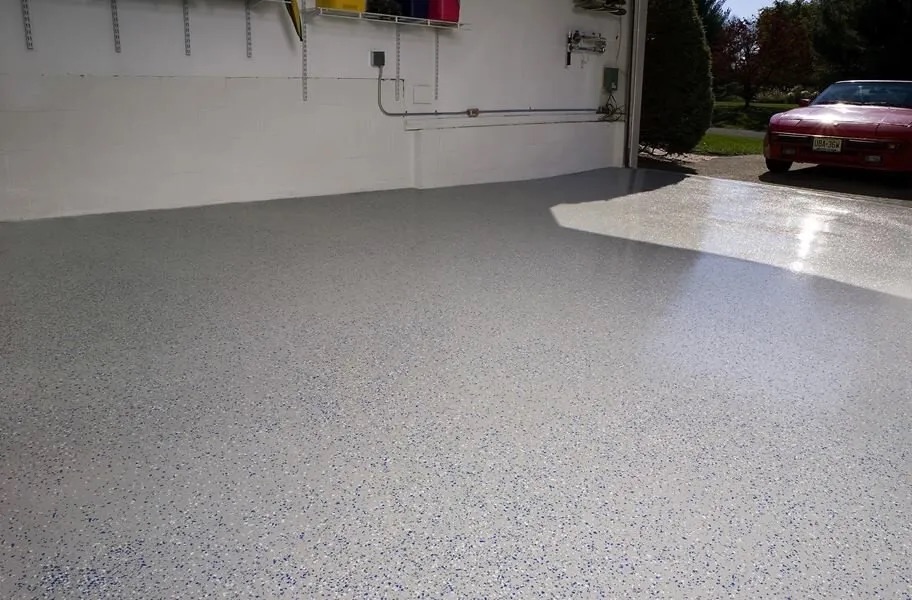Best Rubberized Garage Floor Coatings: Benefits & Options
Garage floors endure relentless punishment—from heavy vehicles and dropped tools to oil spills and temperature swings. Concrete alone can’t always stand up to the challenge. Enter rubberized garage floor coatings, the ultimate fusion of durability, flexibility, and safety. These coatings protect your garage floor from damage, reduce noise, and offer superior slip resistance.
Whether you’re a DIY enthusiast or a commercial garage owner, there’s a rubberized solution tailored to your needs. Let’s explore the best options available and how they can elevate your garage’s functionality and longevity.
Comparison Table: Rubberized Garage Floor Coatings
| Coating Type | Best For | Durability | Slip-Resistant | Waterproof | Installation |
| Rubberized Floor Coating | Standard garages, home workshops | 7–12 years | Yes | Yes | DIY-friendly |
| Rubber Floor Tiles | Heavy-duty vehicle use | 10+ years | Yes | Moderate | Easy to install |
| Rubber Roll Flooring | Large garages, gyms | 8–10 years | Yes | Yes | Moderate |
| Epoxy-Rubber Hybrid | Industrial garages, warehouses | 10+ years | Yes | Yes | Professional install recommended |
| Interlocking Rubber Mats | Temporary garage setups | 5–8 years | Yes | Moderate | Very easy |
Why Choose Rubberized Coatings for Garage Floors?
Rubberized coatings aren’t just about aesthetics—they’re a performance powerhouse for your garage floor. Here’s why they’re a top choice:
- Unmatched Durability: Resistant to cracks, impacts, and chemicals.
- Superior Slip Resistance: Textured surfaces for safer footing, even when wet.
- Shock Absorption: Reduces noise from dropped tools or rolling equipment.
- Temperature Resilience: Withstands extreme cold and heat without cracking.
- Low Maintenance: Easy to clean and resists stains from oil and grease.
Best Types of Rubberized Garage Floor Coatings
1. Rubberized Floor Coating – The DIY Champion
A popular choice for homeowners and DIY enthusiasts, rubberized floor coatings offer a liquid application that dries into a seamless, flexible surface. Perfect for standard garages and workshops, these coatings are highly resistant to oil spills and road salts.
Pros:
✔ DIY-friendly with simple roll-on application
✔ Long lifespan (7–12 years)
✔ Waterproof and slip-resistant
✔ Reduces tire noise
Cons:
✖ Requires proper surface preparation
✖ Can be costly for large areas
2. Rubber Floor Tiles – Built for Heavy Loads
When heavy-duty vehicle use is the norm, rubber floor tiles step up. These thick, modular tiles absorb impact and are resistant to stains and chemical spills. Installation is a breeze—no adhesive needed! Plus, they can be replaced individually if damaged.
Pros:
✔ Excellent for high-traffic garages
✔ Easy to install and replace
✔ Provides superior traction
✔ Long-lasting (10+ years)
Cons:
✖ Seams between tiles can collect dirt
✖ Moderate water resistance (not seamless)
3. Rubber Roll Flooring – Seamless Coverage for Large Spaces
For large garages or home gyms, rubber roll flooring is a cost-effective solution. It offers continuous coverage, minimizing seams where moisture or debris can collect. This option is also popular in multi-purpose spaces where gym equipment meets garage storage.
Pros:
✔ Seamless installation for large areas
✔ Comfortable underfoot and slip-resistant
✔ Waterproof and easy to clean
Cons:
✖ Requires careful cutting and fitting
✖ Moderate installation difficulty
4. Epoxy-Rubber Hybrid – The Industrial Workhorse
If industrial strength is what you need, epoxy-rubber hybrid coatings deliver. These blends combine epoxy’s hardness with rubber’s flexibility, creating a surface that resists heavy impacts and chemical spills. Commonly found in warehouses and commercial garages, they can withstand forklifts and constant vehicle traffic.
Pros:
✔ Superior durability (10+ years)
✔ Resistant to chemicals, oil, and abrasions
✔ Waterproof and slip-resistant
Cons:
✖ Professional installation recommended
✖ More expensive than DIY coatings
5. Interlocking Rubber Mats – Flexible and Temporary
Perfect for temporary setups or rental garages, interlocking rubber mats are the ultimate quick-fix solution. These mats snap together without glue or tools, making them easy to move or reconfigure. They’re also a great option for adding traction in only high-traffic areas.
Pros:
✔ Incredibly easy to install and remove
✔ Affordable and flexible in layout
✔ Provides slip resistance and impact protection
Cons:
✖ Limited waterproofing (moisture can seep between seams)
✖ Shorter lifespan than permanent coatings
Frequently Asked Questions
Is rubber flooring good for a garage?
Yes! Rubber flooring is ideal for garages because it is durable, slip-resistant, and shock-absorbent. It protects your concrete from damage while providing a comfortable, safe surface to walk or work on.
Is liquid rubber good for garage floors?
Absolutely. Liquid rubber coatings form a seamless, waterproof layer that protects against oil spills, road salt, and tire marks. Plus, they’re easy to clean and maintain.
What is the best coating for a garage floor?
The best coating depends on your needs:
- For DIY projects: Rubberized floor coating
- For heavy-duty use: Rubber floor tiles or epoxy-rubber hybrids
- For large spaces: Rubber roll flooring
- For temporary setups: Interlocking rubber mats
Can you put a rubber coating over concrete?
Yes, but preparation is key. Concrete surfaces should be thoroughly cleaned, degreased, and, if necessary, primed to ensure the rubber coating adheres properly and lasts longer.
How do you stick rubber flooring to concrete?
You can use a specialized rubber adhesive for permanent installations or double-sided tape for temporary setups. For liquid rubber coatings, apply a primer to enhance adhesion before rolling or spraying the coating onto the concrete.
Rubberized garage floor coatings are more than just a protective layer—they’re an upgrade to your space’s safety, durability, and aesthetics. Whether you need the resilience of an epoxy-rubber hybrid, the modularity of floor tiles, or the seamless coverage of roll flooring, there’s an option to fit your garage’s unique needs. With the right choice and proper installation, your garage floor will stand strong against wear, tear, and time.

